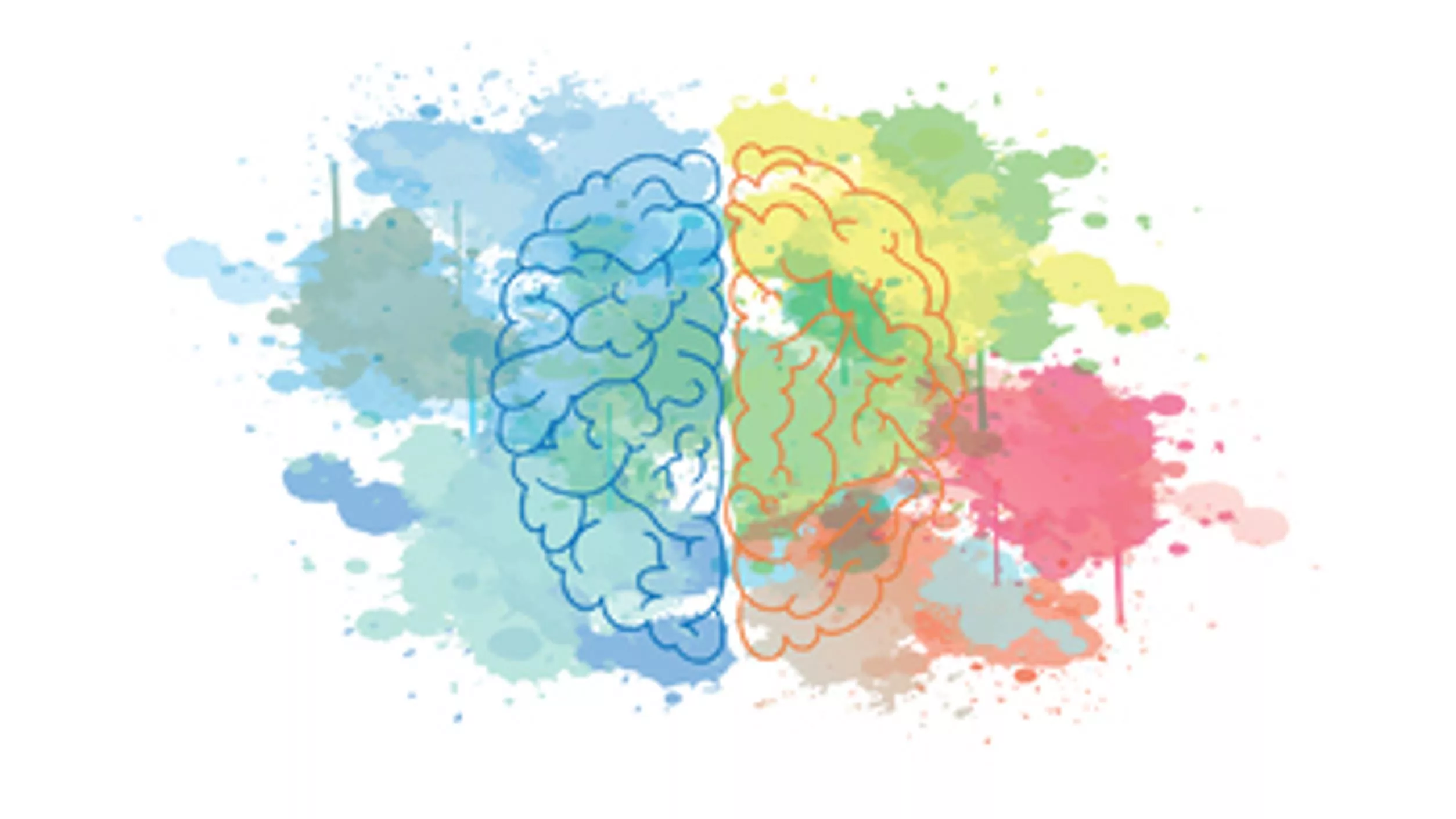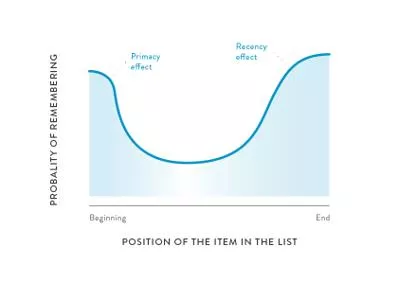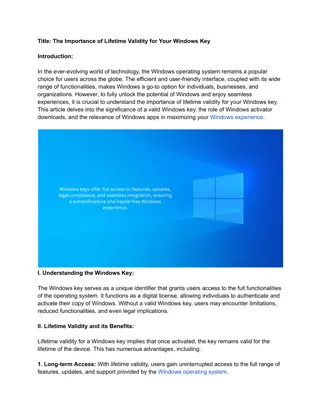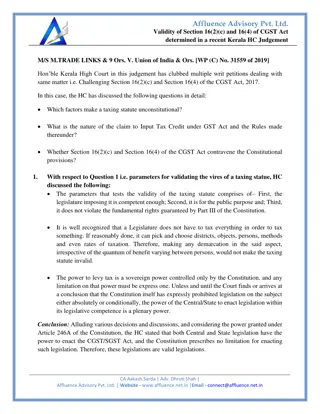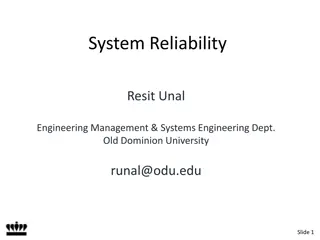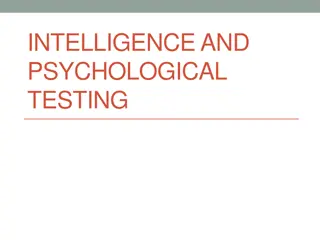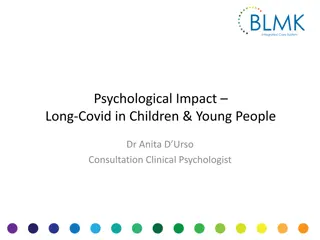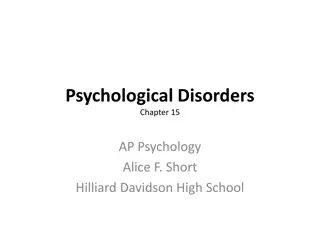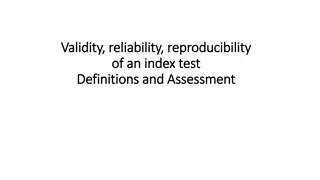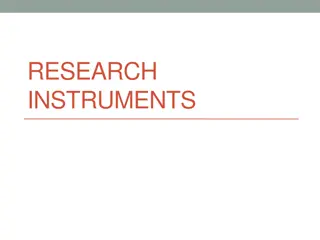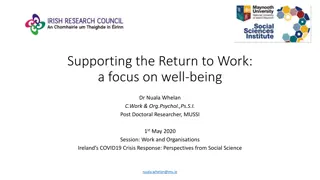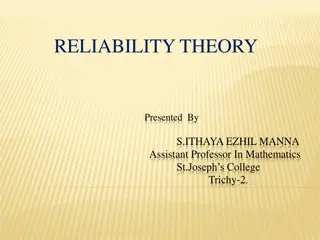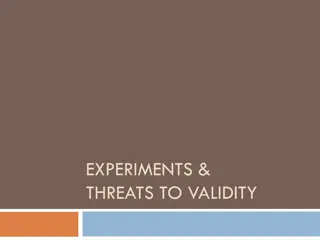Understanding Research Methods: Reliability and Validity in Psychological Studies
In psychological research, understanding reliability and validity is crucial. Reliability refers to consistency in measurements, while validity focuses on whether the results accurately represent the phenomenon being studied. Ensuring both reliability and validity enhances the credibility of research findings and their applicability to real-life situations.
Download Presentation

Please find below an Image/Link to download the presentation.
The content on the website is provided AS IS for your information and personal use only. It may not be sold, licensed, or shared on other websites without obtaining consent from the author. Download presentation by click this link. If you encounter any issues during the download, it is possible that the publisher has removed the file from their server.
E N D
Presentation Transcript
Research Methods Reliability & Validity Wednesday, 17 July 2024 Last lesson Last week Last month What are the two different types of extraneous variables? According to the Multi-store model of memory, how does information move from our sensory register into our STM? What does primacy effect and recency effect mean? Using the Murdock s method, write out a set of standardised instructions that he could have read to his participants. LO: To describe and explain the difference between reliability and validity.
What do you think? What does the word reliability mean? What does the word validity mean? Give an example to support. Give an example to support. LO: To describe and explain the difference between reliability and validity.
Put simply: Valid = real thoughts, feelings, and behaviour. Reliable = repeatable. If another researcher did the same experiment and got similar/same results it would be reliable. If a researcher is observing natural behaviour, asking opinions, or conducts their experiment in a natural setting, it would be considered valid. LO: To describe and explain the difference between reliability and validity.
So why is reliability and validity so important? If research is going to be of any use, the results can t just be a fluke. We expect that if we repeated a study, we could get the same results. Research needs to be reliable. RELIABLE: concerns the consistency of a measurement. Every time a thing is measured the result should be the same. We also expect that the study actually represent what people do in their everyday lives, not just in a laboratory. Research needs to be valid. VALIDITY: concerns whether a result is true . Valid research represents something that is real. We want the study to represent everyday life. LO: To describe and explain the difference between reliability and validity.
Reliability Some important information about reliability: Reliable = repeatable. If you can repeat something and get the same or similar results, you could say that it is reliable. It is consistent across time. Experiments Lab experiments tend to be the most reliable because you can control your variables and standardise procedures. Interviews & Questionnaires If the same person answers same questions in the same way then it would be reliable. Observations Observers watches the same people at the same time and get the same/similar results. (We will look at this in more detail). (Interobserver reliability) Quantitative methods (data in numbers) tends to be more reliable than qualitative methods (data in words). LO: To describe and explain the difference between reliability and validity.
Validity Some important information about validity: Validity = results reflect real world behaviour. E.g. real thoughts, feelings, actions, opinions. Sampling methods Stratified sampling is most likely to accurately reflect your target population. Experimental designs Independent groups design can be made valid by using random allocation. Repeated measures design can be made more valid by using counterbalancing. Qualitative methods (data in words) have greater validity as they provide unrestrictive information e.g. Case studies, open questions. LO: To describe and explain the difference between reliability and validity.
APPLY IT Research Methods A questionnaire was designed by a group of students to investigate attitudes towards social media. Q1. How might reliability be an issue for the students in their questionnaire? Q2. The students gave the questionnaires out to just their close friends. How would this affect the validity of the data collected? Q3. One of their questions in the questionnaire collected qualitative data. Explain why the data collected by this question might have high validity. LO: To describe and explain the difference between reliability and validity.
Q1. Reliability is: a. Trueness of a study b. Consistency c. Results represent real life d. Observation. LO: To describe and explain the difference between reliability and validity.
Q2. Case studies are high in validity because: a. Results are easy to analyse b. Conclusions are subjective c. Detailed information d. No ethical issues. LO: To describe and explain the difference between reliability and validity.
Q3. An extraneous variable: a. Is deliberately changed in an experiment b. Is an uncontrolled variable that could affect the DV c. Is measured in an experiment d. Occurs only in field studies. LO: To describe and explain the difference between reliability and validity.
Q4. Being able to recall the words at the start of a list refers to the: a. Recency effect b. Primacy effect c. Serial position curve d. Dependent variable of the study. LO: To describe and explain the difference between reliability and validity.
Q5. The three types of LTM are: a. Episodic, acoustic, semantic b. Visual, semantic, procedural c. Recognition, acoustic, episodic d. Episodic, semantic, procedural. LO: To describe and explain the difference between reliability and validity.
Lets think about what we have learnt today. 1. Tell me something new that you have learnt today. 2. What knowledge/skills have you used today from previous lessons? (Think about other subjects) LO: To describe and explain the difference between reliability and validity.


